Recent News
Not your mother’s nanomedicine: NIH grant targets safer medication for women
October 20, 2025
AI tensor network-based computational framework cracks a 100-year-old physics challenge
September 16, 2025
Postdoctoral research fellow wins 1st place in conference poster presentation
August 25, 2025
Engineering a new treatment for ovarian cancer
June 24, 2025
News Archives
Award Season for the Canavan Group
November 30, 2018
It has been a busy and productive semester for the Canavan Group.
Lobos Keep Their Cool
Students from Prof. Heather Canavan’s group recently won the “Keep it Cool” Challenge sponsored by Dion’s, a local pizza chain . Dion’s, which has been an Albuquerque favorite for more than 25 years, recently introduced a new addition to its popular salad dressings: green chile ranch dressing. The salad dressings are so popular that Dion’s sells bottles of dressing for home use. However, former Burqueños living out of the state have been unable to try the new dressing, due to Dion’s inability to keep their dressings cold for a reasonable cost.
That is, until now!
The UNM innovation Academy (iA) and STC.UNM recently co-hosted the Dion’s “Keep it Cool” Challenge, which had one aim: design a low-cost method (<$10) to keep salad dressing at <5 C for 48-72 hours.
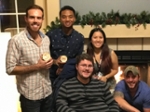
The winning team included undergraduate and graduate students from the Biology and Chemical & Biological Engineering Departments: Phuong Nguyen, Tye Martin, Ben Matheson, and Johnny Yarmey (PhD students in the Biomedical Engineering grad program), as well as Darnell Cuylear (BS student in the Biology department).
The winning team walked away with $1,000 in gift cards, as well as free pizza from Dion’s for a year. When asked how the team was going to use their prizes, team leader Phuong Nguyen said “we voted, and decided as a team to take all of the Canavan group members out for dinner, and to see the new 'Fantastic Beasts' movie.”
When asked about the team’s win, Prof Canavan said “I am incredibly proud of this team. They worked together to design, test, and iterate on their project, and they never lost sight of the main goals: it didn’t have to be the most technologically advanced or fanciest design—it had to be an affordable option that was could be easily replicated by regular people at Dion’s. I’m also proud of how they chose to use their winnings—to celebrate as a group. I know that most people dread group projects, but these guys really work as a team.”
Biomedical Engineering is Well-represented at LoboBITES
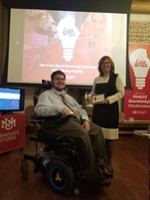
At this year’s Shared Knowledge Conference, four of the final eleven presenters in the “LoboBITES” competition are from the Biomedical Engineering graduate program. Phuong Nguyen, Tye Martin, and Adeline Fanni presented the PhD dissertation research they are pursuing in the groups of Profs. Heather Canavan (Nguyen and Martin) and Eva Chi (Martin and Fanni). Emma Garcia is presenting research from her masters project working with Prof. Christina Salas. According to Prof. Canavan, this is the first time that students from this relatively new graduate program have presented in the competition.
“The BME graduate program was established in 2010, and has grown exponentially since then. The research projects presented by these students highlights the kind of creativity and breadth that the program now represents, including fundamental technical contributions to understanding the underlying mechanisms of diseases like Alzheimer’s and Parkinson’s, as well as applied research with new technology to improve patient experiences and outcomes.”
At the semi-finals for the LoboBITES competition, the students presented their research in a “3-minute Thesis” style first used by the University of Queensland. Graduate students from all UNM degree programs submitted their research. “This style is a tough one, because it forces students to think through how to present their research in a way that can be distilled down to just a few ideas, in a way that is understandable to a non-technical general audience.” Prof. Eva Chi agrees "I’m pleased to see so many students from science and engineering programs competed, and did so well as to make it into the finals. Our Department (Chemical & Biological Engineering) has been working hard to help our students improve their communication skills, in preparation for their later careers. You can definitely see that hard work paying off!”
Canavan Group Honored at International Symposium
In October, Prof. Heather Canavan was made a Fellow of the AVS society, for her innovative and sustained contributions to the understanding of stimulus-responsive materials, such as bioactive polymers. That same night, a graduate student in Canavan’s group, Ms. Phuong Nguyen, was awarded the Dorothy and Earl Hoffman Award in the society for her outstanding research using stimulus-responsive polymers to improve patient experiences to prevent colorectal cancer.
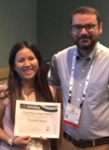
Canavan’s award also acknowledged her outstanding efforts "leading transformative, innovation-focused educational platforms that encourage women and underrepresented minority student participation in STEM fields.” She reflected on the fact that her award recognizes both educational and research contributions by saying “I couldn’t do one without the other. It was Phuong’s Vietnamese heritage that provided the spark to transform the unpleasant experiences that patients have drinking GI prep liquids into a more palatable “bubble tea” experience. I wouldn’t have had that inspiration without her. I’ve been fortunate to work with so many talented young people over my 15 year career at UNM, and they’ve all influenced our research with their backgrounds and skills. So I see this award as a recognition of their hard work, too."
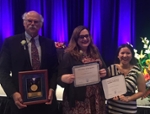
At the same award ceremony, Canavan’s postdoc advisor was presented with the Medard Welch award, the highest award presented by the society. In attendance at the award ceremony were his wife, colleagues, and many former students—and in the case of Phuong Nguyen, his ‘academic grandchild’.” After the award ceremony, Canavan said “I am grateful to the AVS for recognizing my work with this commendation. But it is even more special that I got to share the spotlight with my postdoctoral advisor and student who were also recognized, as well. It was a great honor."
NSF I-Corps Program is Turning Engineers into Entrepreneurs
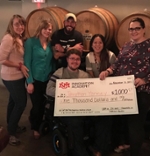
Prof. Heather Canavan’s group has been very active in the program, with at least two students participating each semester. Canavan reflected on how participation in the program has impacted her students: “At first, I thought that the NSF I-Corps program would be a convenient way for all of my students to get a bit more preparation for careers in industry, through learning about patenting, licensing, and customer discovery.”
However, the students have learned much more. According to 2 time participant Ben Matheson, participating in I-Corps gives the students the feeling of true ownership over their projects, including the $3,000 budget for their projects.
One of the most exciting aspects of the program is the students’ chance to pitch their ideas to a packed audience of judges at venues such as Bow & Arrow, which was packed with excited family members and friends who gathered to support their friends. Johnny Yarmey, a new graduate student in the Biomedical Engineering graduate program, presented an idea that came from his experience as a paramedic, and Navy veteran. Citing difficulties that first responders have in re-establishing airways for unconscious patients, Yarmey has designed a new method to intubate patients that will be gentler on patients, as well as the paramedics who treat them.
When asked about Yarmey’s win, Canavan said “Johnny was able to use his background as a first responder to identify a clear need to improve patient outcomes, and he’s using his education and opportunities in the BME program to bring those ideas to life. I’m incredibly proud of him, as well as all of my students who have participated in I-Corps. It’s helped us create an entirely new research area at UNM in patient-centered design.”
